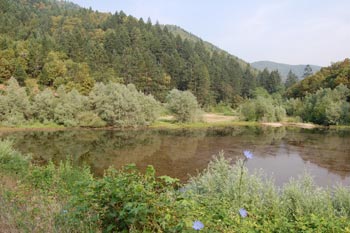My View: A Watershed Vote on the Future of the Watershed
Disclosure: this as an opinion piece.
Guest Opinion by Whitman Parker, Publisher Jacksonville Review
I remain a strong proponent of the Jacksonville-led effort to complete a land swap with the Motorcycle Riders Association and was pleased when our City Council voted 5-2 to proceed with the negotiations. If successful, parties will swap 40 acres of MRA land for 380 of city land with the city receiving up to $1,000,000. This deal isn’t all about money – it’s about a rational plan that solves long-standing use conflicts in Jacksonville’s watershed.
Jacksonville’s 1800 acre watershed is located one mile northwest of the city limits. In the lower area, near the city’s aging reservoir, the MRA owns a 40 acre parcel, improved with a parking lot and staging area. Here, MRA riding trails act as “side streets,” essentially moving OHV users to a vast network of trails further west and north – mostly on BLM land stretching to Gold Hill and beyond. The MRA 40 abuts the Forest Park – a new, county-recognized public park, comprising 1420 acres of city-owned and managed land, which includes the reservoir.
The Forest Park now has thirteen hiking and mountain biking trails, created over the last five years, some of which recently served as the site for professional mountain biking races that attracted hundreds of nationwide athletes.
Since the 1950’s when Jacksonville tapped into Medford’s water system, little has been done to maintain the reservoir and dam. The city has been ordered to fix the dam, with estimates ranging from $50,000 to $1.7M. The state of Oregon’s patience is reportedly wearing thin – during a major rain event, it is feared the dam will be breached, resulting in catastrophic downstream flooding of the National Historic Landmark District.
On December 6, I urged the council to consider those repair costs when weighing the MRA swap, since sale funds could cover repair costs. I argued that a special assessment or property tax hike seemed illogical if the money could be obtained by the swap.
However, there’s a stumbling block to the long-term viability of the Forest Park. Unfortunately, like oil and vinegar, hikers and OHV’s don’t mix well. It’s worth noting the 380 acres of Jacksonville land is NOT designated park land and lies as far from town as possible. Much of that land is steep and adjoins land already owned by the MRA. The swap offers a common sense means of removing the MRA from the lower passive use Forest Park, thereby moving OHV’s as far away from hikers as possible.
Five years ago, a proposal which called for trading the MRA 40 for 800 acres of city-owned land was defeated and never materialized, due to a justifiable outcry from 850 petition-wielding citizens. In early 2010, the Watershed Stakeholders Group, of which I was an active member, formulated a scaled-back plan to swap 280-380 acres, less than half of the original acreage. That plan included extensive land management guidelines to assure that all streams and land would be protected by enforceable policies.
That Stakeholders plan almost succeeded but was derailed when a councilor proposed bringing the swap to a public vote. On July 6, 2010, the council voted 5-2 to refer the matter to the public and explore placing it on the November, 2010 ballot. Afterwards, the MRA expressed its disappointment that the council had violated assurances to handle land negotiations at a city council level. The MRA had expressed it was not interested in a bumper sticker campaign wherein it would likely be smeared as “anti-environmental.” In my view, when the MRA advised the city of its stand, it took the only rational road possible and effectively ended the discussion. At that time, Jacksonville’s city attorney had also advised council that public votes on land use matters were highly unusual, noting land use decisions were the council’s to make. Today, swap opponents are shamefully failing to mention the city attorney’s advice when communicating with the citizenry.
Opponents have not stated whether they would support the swap if placed on the ballot. Rhetoric-filled letter writers are unfairly brandishing the “vote” concept as a political ploy to shout, “Your council is denying you the right to vote and violating your political rights.” By stirring the “unfairness” pot, swap opponents are avoiding the real issue at hand – whether or not the swap plan is in Jacksonville’s best interest.
In this land use matter, the Jacksonville City Council must act responsibly by voting up or down rather than transferring its decision-making obligations to others.


[…] To read an editorial on the topic by the publisher, click here Share this: […]